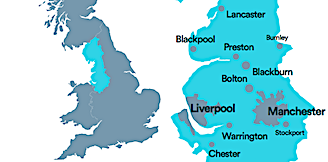Warrington-based water giant United Utilities has reported an underlying loss before tax of £34 million for the year to March 31, 2023, amid a “challenging year of cost pressures” — as the FTSE 100 firm outlined plans to urgently invest in its infrastructure.
United Utilities’ net debt rose from £7.6 billion to £8.2 billion.
Full year dividend will be 45.51p per share, up 4.6% — amounting to a payout of £310.3 million.
United Utilities is the UK’s largest listed water and wastewater company.
United Utilities CEO Louise Beardmore said: “I understand and share concerns about the use of storm overflows and I am committed to respond to the challenges we face …
“We have won support from regulators and are able to make an early start on over £900 million of investment …
“In October we will be putting forward an ambitious plan for the next regulatory period, including our biggest environmental programme yet, targeting a significant improvement in storm overflow performance.
“It is clear that we need to invest in infrastructure, assets and our people to meet new environmental targets and deliver the further performance improvements customers and communities want to see.”
United Utilities said revenue fell 2% to £1.824 billion “largely reflecting lower consumption more than offsetting the allowed regulatory revenue increase.”
The firm said reported profit before tax decreased by £184 million to £256 million “reflecting the £169 million decrease in reported operating profit and a £48 million increase in reported net finance expense, partly offset by a £31 million profit on disposal of our subsidiary United Utilities Renewable Energy Limited, and a decrease in the share of losses of joint ventures of £2 million.”
REACTION:
Aarin Chiekrie, equity analyst at Hargreaves Lansdown: “United Utilities appear to have a leak in their profit pipeline as we saw operating profits take a tumble.
“In return for providing a reliable and affordable water supply to North West England, the regulator allows the group to earn an acceptable return.
“The only issue is, high levels of inflation are really taking their toll on costs. Coupled with lower revenues as customers are actively being encouraged to save water, it’s no surprise to see profits dry up.
“But falling revenues should only be a temporary problem, since over the medium term the group’s able to increase its prices alongside inflation.
“And if the amount of water it bills its customers for falls below a certain threshold, the regulator will pay United Utilities the difference.
“But these funds are only received two years later. So in the short term, we’re seeing cash flows and earnings that are feeling the impact of rising costs and declines in water usage.”
